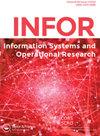Cloud model-based best-worst method for group decision making under uncertainty
IF 1.6
4区 计算机科学
Q4 COMPUTER SCIENCE, INFORMATION SYSTEMS
引用次数: 0
Abstract
AbstractThis study aims to enhance computational and analytical aspects of multi-criteria group decision-making (MCGDM) under uncertainty. For this, we use the best-worst method (BWM) and cloud models to develop a more reliable MCGDM algorithm including three stages: first, collecting data through the BWM reference pairwise comparison; second, extracting interval-weights using the BWM bi-level optimisation models and aggregating different opinions via cloud models; and third, using the technique for order of preference by similarity to ideal solution (TOPSIS) to prioritise alternatives. We have also investigated the effectiveness of the proposed approach in a real-life problem of online learning platform selection within the context of the COVID-19 pandemic lockdown. The experiment results demonstrate the superiority of the proposed method over the Bayesian BWM in terms of computational time by 96%. Moreover, the proposed approach outperforms BWM and Bayesian BWM techniques by 33% and 25%, respectively, in terms of conformity to the decision-makers’ intuitive judgments. Our findings also bring important practical implications. Application of the proposed method led to robustness against the number of decision-makers and significantly increased time efficiency in group decision-making. Besides, the computations with the lower inconsistency enhanced the effectiveness of prioritisation in group decision-making.Keywords: Multiple criteria group decision-makinguncertaintycloud modelsinterval weights AcknowledgementsThis research did not receive any specific grant from funding agencies in the public, commercial, or not-for-profit sectors. No potential conflict of interest was reported by the authors. The data that support the findings of this study are available from the corresponding author.Disclosure statementNo potential conflict of interest was reported by the authors.基于云模型的不确定条件下群体决策的最佳-最差方法
摘要本研究旨在提高不确定条件下多准则群体决策的计算和分析能力。为此,我们利用最佳-最差方法(BWM)和云模型开发了一个更可靠的MCGDM算法,包括三个阶段:第一,通过BWM参考两两比较收集数据;其次,利用BWM双层优化模型提取区间权重,并通过云模型汇总不同意见;第三,使用与理想解决方案相似的偏好排序技术(TOPSIS)来对备选方案进行优先排序。我们还研究了该方法在COVID-19大流行封锁背景下在线学习平台选择的实际问题中的有效性。实验结果表明,该方法比贝叶斯BWM算法的计算时间节省了96%。此外,在符合决策者的直觉判断方面,该方法比BWM和贝叶斯BWM技术分别高出33%和25%。我们的发现也带来了重要的实际意义。该方法的应用使其对决策者数量具有鲁棒性,显著提高了群体决策的时间效率。此外,不一致性较低的计算提高了群体决策中优先排序的有效性。关键词:多标准群体决策不确定性云模型间隔权重确认本研究未获得公共、商业或非营利部门资助机构的任何特定资助。作者未发现潜在的利益冲突。支持本研究结果的数据可从通讯作者处获得。披露声明作者未报告潜在的利益冲突。
本文章由计算机程序翻译,如有差异,请以英文原文为准。
求助全文
约1分钟内获得全文
求助全文
来源期刊

Infor
管理科学-计算机:信息系统
CiteScore
2.60
自引率
7.70%
发文量
16
审稿时长
>12 weeks
期刊介绍:
INFOR: Information Systems and Operational Research is published and sponsored by the Canadian Operational Research Society. It provides its readers with papers on a powerful combination of subjects: Information Systems and Operational Research. The importance of combining IS and OR in one journal is that both aim to expand quantitative scientific approaches to management. With this integration, the theory, methodology, and practice of OR and IS are thoroughly examined. INFOR is available in print and online.
 求助内容:
求助内容: 应助结果提醒方式:
应助结果提醒方式:


